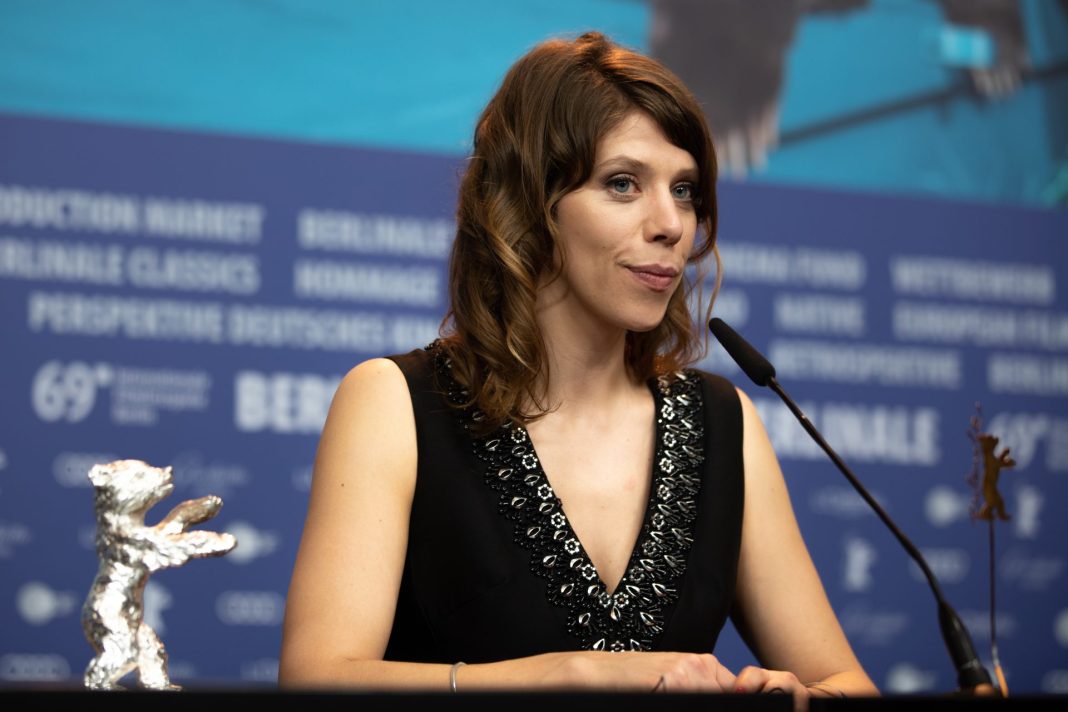CW: Alcohol abuse
Adapted from Amy Liptrot’s 2016 memoir of the same name, Nora Fingscheidt’s The Outrun (2024) is a story of addiction, wilderness and fraught ties to home. Saoirse Ronan plays Rona, a 29-year-old graduate reeling from the end of a relationship catalysed by her alcohol addiction. The Outrun unfolds between London and Orkney, places that represent the two poles of Rona’s person. (The film repeatedly cuts back to her past life in the city – a thrilling, dysfunctional period of love, parties and spiralling alcoholism.)
We meet Rona as she visits her childhood home in Orkney. She’s returning after a period of rehab with Alcoholics Anonymous in London. The film’s early sequences follow the protagonist as she wanders along beaches and cliffs, helps on her father’s sheep farm (Ronan delivered seven lambs during filming), and listens to electronic music. Fingscheidt maps the geography of her scenes (Orkney’s rocky outcrops, the village café, and dark London streets) onto Rona’s inner landscape. Rona’s travels between her parents’ houses, who live separately and estranged, double as explorations of her troubled interior. This is the subtext throughout the film: emotional and actual distances are inextricable, to travel one is to travel the other.
But Orkney is not an easy place to return to. Rona finds warmth in her maternal home but is frustrated by her mother’s religiousness: “I’ll pray for you” her mother says. Pressure accumulates. Rona begins caring for her eccentric father as he wavers between bipolar episodes. When it’s time to leave, to escape the sticky web of family and harsh landscapes, Rona seems ready. But when the southbound ferry arrives, something jams. She panics and runs away from the port. Orkney is where she must be for now.
A violent relapse follows, then a summer job on a remote nature reserve with the RSPB. The flashbacks to her London life intensify. Damien – played sensitively by Paapa Essiedu – the man she loved (and lost) in the city, repeatedly lurches into the narrative. Here the film finds its central arc as Rona reassembles herself in the remotest corners of her home islands. On the surface her purpose is clear: to stay sober. What’s less overt is the way this journey demands a confrontation with childhood trauma, spoiled love and future hopes.
Saoirse Ronan’s performance holds The Outrun together. She sensitively inhabits a character at once debilitated by alcohol and full of the joys in the wildlife around her. Rona’s struggle with drink is a messy path of grey zones and cutting temptations, of tall highs and deep lows. The maturity of Ronan’s performance allows these peaks and troughs a great visibility. There is genuine tenderness achieved in scenes between parents and child – moments in which family histories, care, and the rugged landscape coalesce vividly in the speakers’ faces.
Fingscheidt works hard to embed the film with local myths from Orkney through the use of voiceovers and cutaways. Sometimes these layers gave the film an engaging texture, but too often they created a feeling of ‘jumping around’ at the expense of narrative clarity. The voiceover told the folklore in an almost laboured manner, as if the director was forcing Rona’s story into a lineage of local mythology.
More attention could have been paid to the ‘folklore’ of the film’s supporting characters. Rona’s mother (played by Saskia Reeves) had little time to recount her experiences as an isolated mother with an unpredictable, sometimes violent husband. There was surely more to be heard from Rona’s father (Stephen Dillane) too – a brilliant peripheral persona whose history and wisdom went mostly unexplored. Perhaps if it cut back on drone shots and slow-motion waves, the film would’ve had time to dwell on these characters.
Yet The Outrun is a considerable achievement. It’s a study of emotional and physical geography in the same breath, an intimate portrayal of the minutiae of alcohol addiction. Ronan, like the Orkney cliffs, cuts through the cold air with charisma and poise.


